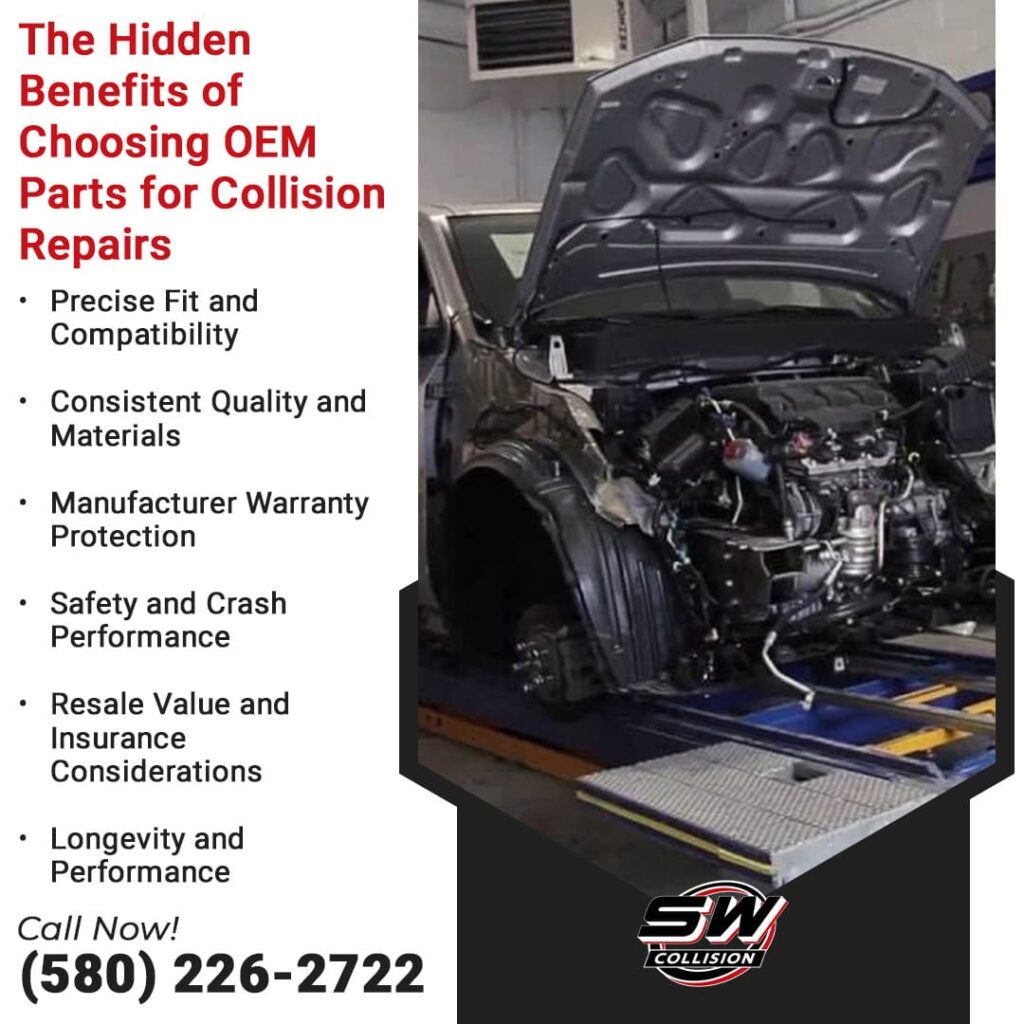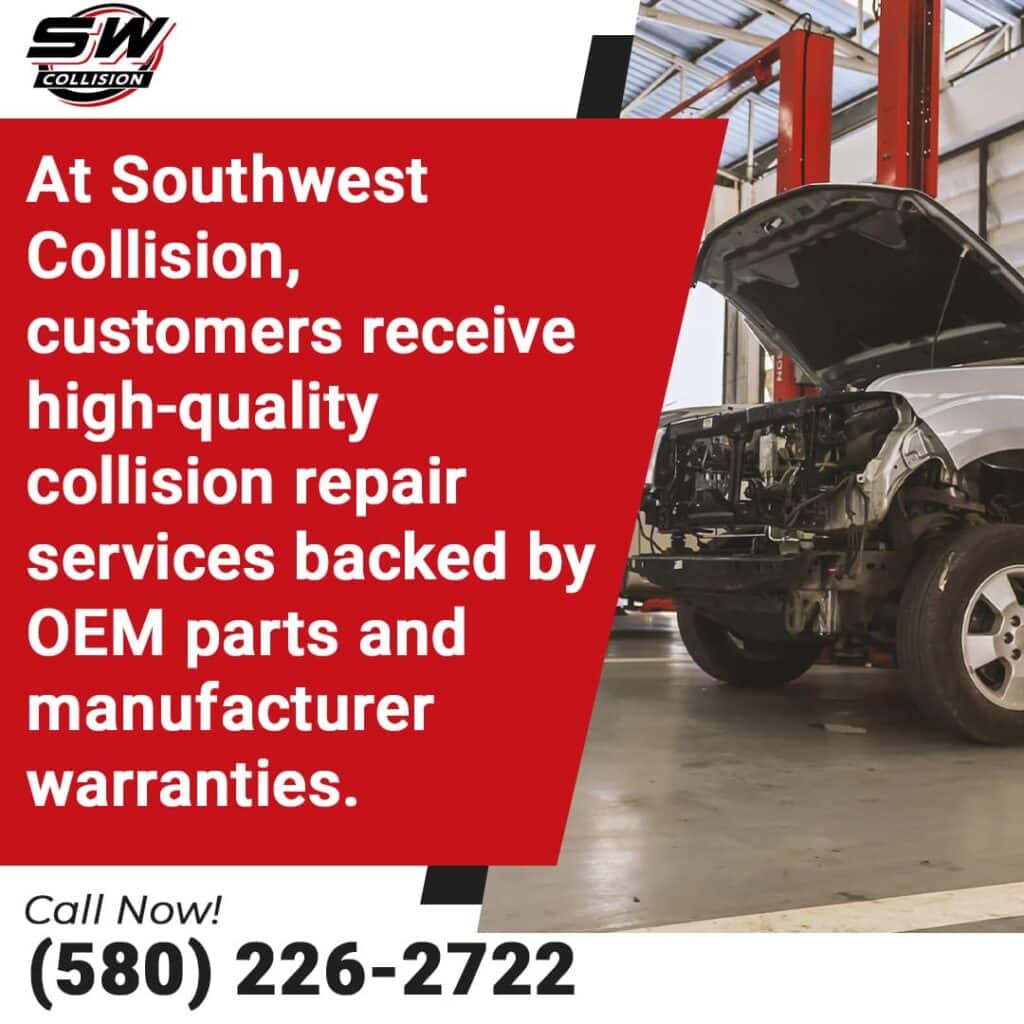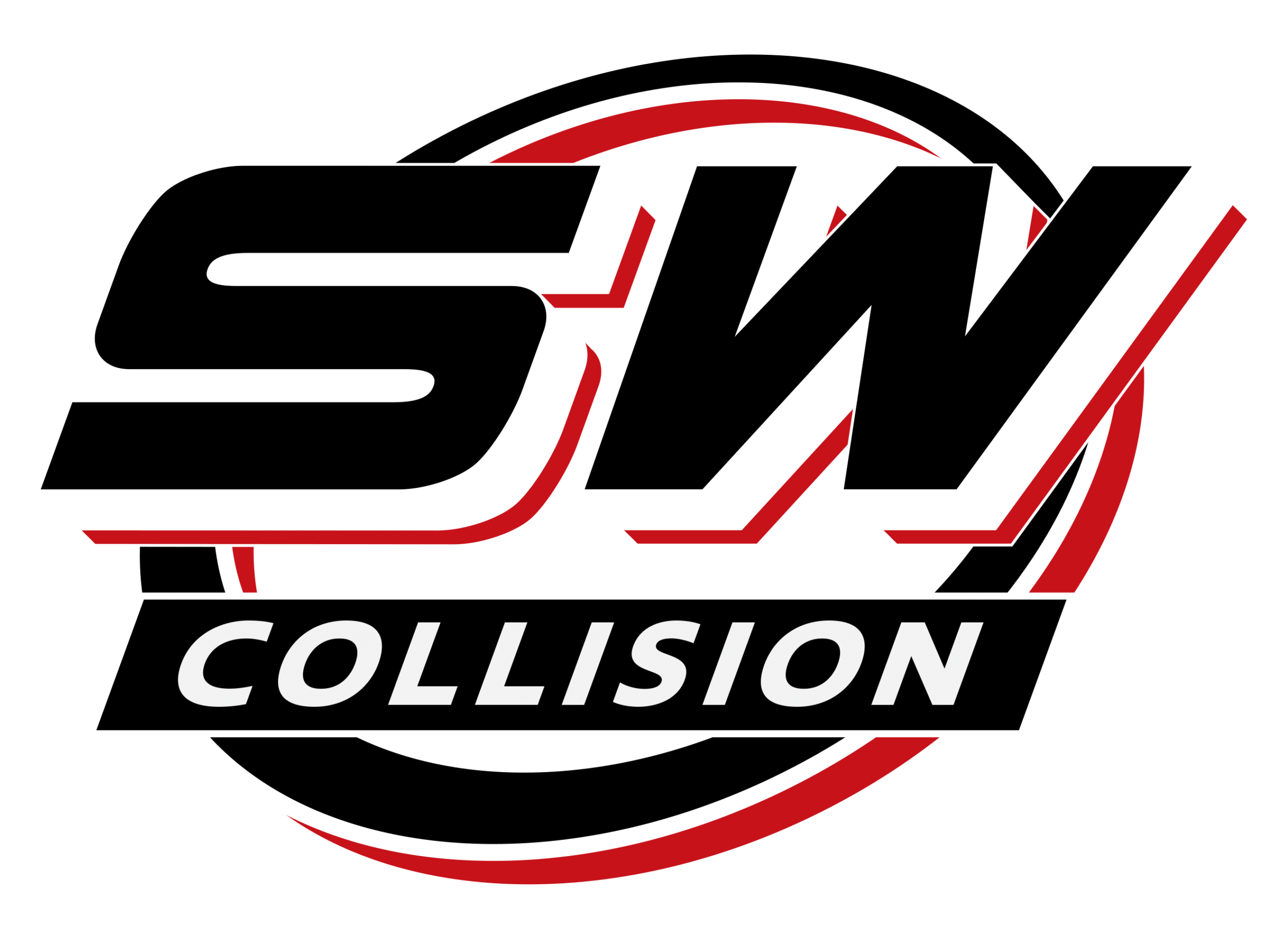Vehicle owners often face critical decisions after an accident, including selecting the right parts for repair. Many assume that all replacement parts offer the same quality, but this is not the case. Original Equipment Manufacturer (OEM) parts, designed by the vehicle’s manufacturer, maintain the integrity of the original design, while aftermarket alternatives vary in quality, fit, and performance. At Southwest Collision, using OEM parts whenever possible in collision repair services makes sure that vehicles retain their safety standards, structural integrity, and long-term value.
Choosing OEM parts also helps prevent common issues associated with aftermarket components. Poorly fitting parts can lead to misaligned panels, increased wear, and compromised safety in future collisions. Some insurance policies may push for aftermarket parts to reduce costs, but these short-term savings can result in costly repairs down the line. OEM parts eliminate these risks by offering a precise fit and manufacturer-backed reliability. At Southwest Collision, based in Ardmore, OK, we prioritize safety and quality, guaranteeing that every repair restores vehicles to their original condition using OEM parts whenever possible.
Key Takeaways
OEM parts maintain vehicle safety – Choosing OEM parts for collision repair makes sure that airbags, crumple zones, and other safety features function as originally designed. Poorly fitting aftermarket parts can compromise structural integrity.
OEM parts provide a precise fit – Unlike aftermarket alternatives, OEM components are designed for exact compatibility, reducing labor costs and potential issues during collision services.
OEM parts help retain resale value – Vehicles repaired with OEM parts often sell for higher prices, as buyers trust the quality and longevity of the repairs.
OEM parts protect manufacturer warranties – Many automakers void warranties when non-OEM parts are used, leading to potential out-of-pocket expenses for future collision repair needs.
OEM parts provide long-term reliability – These components undergo rigorous quality testing, reducing the risk of premature wear or failure compared to aftermarket options in collision services.

Understanding OEM vs. Aftermarket Parts
Choosing the right replacement parts after an accident is one of the most important decisions in collision repair. The choice between OEM (Original Equipment Manufacturer) parts and aftermarket parts affects the vehicle’s safety, durability, and resale value, as well as the overall performance and integrity of the car. When working with an auto body collision repair shop nearby, selecting OEM parts makes sure that the vehicle is restored to its original condition, preserving both function and appearance.
Understanding the Difference Between OEM and Aftermarket Parts
OEM Parts: Precision, Safety, and Warranty Protection
OEM parts come directly from the vehicle’s original manufacturer, guaranteeing a perfect fit and proper function. These components match the car’s original design, using the same materials, engineering, and safety standards. OEM parts also maintain the vehicle’s warranty, preventing potential issues with coverage. Since they are engineered for seamless installation, they reduce labor costs and prevent structural misalignment.
Example: A vehicle repaired with an OEM bumper will align perfectly with the car’s other body panels, maintaining proper airbag deployment and crash impact absorption. An improperly fitted aftermarket bumper may shift during impact, reducing passenger protection.
Aftermarket Parts: Cost Savings with Potential Trade-Offs
Aftermarket parts are manufactured by third-party companies attempting to replicate OEM designs. While some high-quality aftermarket parts exist, many vary in material strength, durability, and fit. In some cases, they require additional adjustments, increasing labor costs and potentially compromising safety.
Example: A driver replacing a damaged fender with an aftermarket part may face extra modifications to make it fit properly. This could lead to higher labor costs and a longer repair process. Choosing an OEM fender would likely result in a faster, more precise repair.
Choosing OEM parts for collision services helps protect vehicle integrity, long-term value, and safety standards, providing reliable performance on the road.
The Benefits of Choosing OEM Parts
1. Better Fit and Appearance
OEM parts match the exact specifications of your vehicle, preventing issues like misalignment or gaps. This makes installation smoother and preserves the car’s original look.
Example: A customer choosing an aftermarket fender may save money. The part would, however, require modifications to fit, increasing labor costs and leaving a slight misalignment. An OEM fender would fit properly without extra work.
2. Consistent Performance and Durability
OEM parts go through strict testing by the manufacturer, making them more reliable than many aftermarket alternatives. The materials and design are made to last, reducing the chances of future failures.
Example: A driver who installs an aftermarket radiator may experience leaks within months due to lower-quality materials. This could lead to additional repair costs and further damage. Choosing an OEM radiator would likely provide greater durability and long-term reliability.
3. Maintained Safety Standards
Car manufacturers design safety systems to work with specific parts. Even small changes in structure can affect airbag timing, crumple zones, or crash resistance.
Example: Studies from the Insurance Institute for Highway Safety (IIHS) show that cars repaired with aftermarket structural parts may not perform as well in crash tests. This raises concerns about using non-OEM parts in collision services.
4. Warranty Protection
Many car warranties only apply when using OEM parts for repairs. Installing aftermarket parts may void coverage, leaving owners with unexpected costs.
5. Higher Resale Value
Vehicles repaired with OEM parts often sell for more than those using aftermarket parts. Buyers look for well-maintained vehicles, and OEM parts show that repairs were done with care.
Example: Imagine two identical cars listed for sale. One had been repaired with OEM parts, and the other with aftermarket parts. The OEM-repaired car could be sold for 10% more because buyers trust its auto collision repair quality.
Common Myths About Aftermarket Parts
- “Aftermarket Parts Are Always Cheaper” – While the upfront cost is lower, poor fit or durability can lead to extra labor and additional repairs. The National Association of Mutual Insurance Companies states that aftermarket parts cost about 50% less than OEM parts, but their long-term reliability varies.
- “Aftermarket Parts Work Just as Well” – Some aftermarket parts function properly, but quality varies. OEM parts are manufactured to meet the exact specifications of the original components, guaranteeing the best performance and compatibility. According to NerdWallet, OEM parts tend to be more reliable than aftermarket parts and last longer.
Why Southwest Collision Uses OEM Parts Whenever Possible
At Southwest Collision, we believe in providing collision services that restore vehicles to their original condition. Using OEM parts helps retain vehicle strength, function, and appearance.
What We Offer:
- Safety – When possible, we use OEM parts that match your vehicle’s original design and safety features.
- Durability – OEM parts last longer and prevent avoidable repairs.
- Resale Value – Keeping your car as close to factory condition as possible helps retain its worth.

Frequently Asked Questions
1. Why should I choose OEM parts for auto collision repair?
OEM parts match the original specifications of your vehicle, providing a precise fit, reliable performance, and maintained safety standards. At Southwest Collision, whenever possible, we use OEM parts to restore vehicles to their original condition, preventing issues that can arise with aftermarket alternatives.
2. Do OEM parts cost more for auto collision repair?
OEM parts may have a higher upfront cost compared to aftermarket parts, but they help avoid additional labor expenses and future repairs. At Southwest Collision, we prioritize quality and long-term savings by, when possible, using OEM parts that fit perfectly and last longer.
3. Will using aftermarket parts affect my auto collision repair warranty?
Yes, many vehicle warranties require OEM parts for repairs. Installing aftermarket parts can void coverage, leaving you responsible for future repair costs. At Southwest Collision, our collision repair team, when possible, uses OEM parts to protect your vehicle’s manufacturer warranty.
4. Are OEM parts safer for auto collision repair?
Yes, OEM parts are designed to meet the same safety standards as the original components, providing that airbag timing, crumple zones, and structural integrity remain intact. Collision services at Southwest Collision prioritize safety by, when possible, using OEM parts that keep your vehicle as safe as it was before the accident.
5. Can Southwest Collision order OEM parts for any vehicle?
Yes, Southwest Collision works with manufacturers to source OEM parts for all makes and models. We make sure every part used in your auto collision repair meets factory standards for quality, durability, and performance.
The Best Choice for Collision Repair
At Southwest Collision, using OEM (Original Equipment Manufacturer) parts in auto collision repair is a priority. These parts are built specifically for your vehicle’s make and model, providing a precise fit, reliable performance, and long-term durability. When you choose OEM parts, you maintain your vehicle’s original safety features and structural integrity, just as the manufacturer intended.
While aftermarket parts might seem like a cost-saving option, they often lead to hidden expenses. Many of these parts are made with less expensive materials, causing premature wear and tear. They may also require modifications to fit correctly, increasing labor costs during installation. In some cases, aftermarket parts can even affect how well your vehicle holds up in future accidents.
At Southwest Collision, when possible, repairs use OEM parts to maintain your vehicle’s safety, value, and performance. Our team delivers high-quality workmanship, repairing your car to manufacturer standards. By choosing OEM parts, you reduce the need for frequent replacements, unexpected repair costs, and potential safety risks. When searching for an auto body collision repair shop nearby, trust Southwest Collision for OEM-backed repairs that protect your investment. For reliable collision services, contact us today at (580) 226-2722 or sw.collision@yahoo.com.
